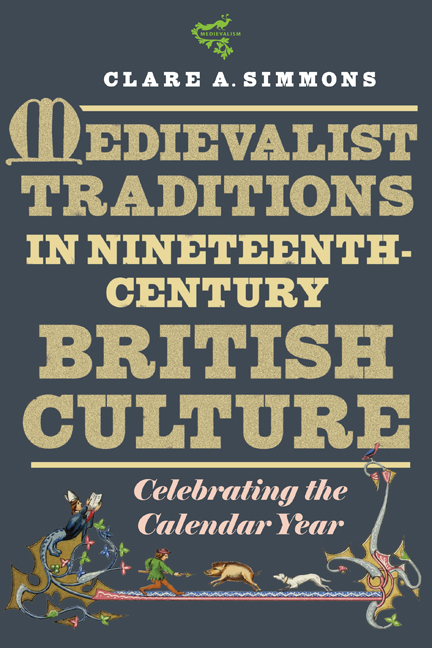Book contents
- Frontmatter
- Dedication
- Contents
- List of Illustrations
- Preface
- Acknowledgments
- List of Abbreviations
- Introduction: Medievalizing Time
- 1 The Christian and Not-So-Christian Year
- 2 Medievalist Calendar Experiments
- 3 Christmas Becomes a Season
- 4 Winter Love: St Agnes and St Valentine
- 5 Rites of Spring: Imagining Origins
- 6 Summer Festivals: Religion in Performance
- 7 Fragmented Autumn: Harvest-Home to Lord Mayor's Show
- Epilogue: Christmas Ghosts
- Bibliography
- Index
- Miscellaneous Endmatter
7 - Fragmented Autumn: Harvest-Home to Lord Mayor's Show
Published online by Cambridge University Press: 09 February 2021
- Frontmatter
- Dedication
- Contents
- List of Illustrations
- Preface
- Acknowledgments
- List of Abbreviations
- Introduction: Medievalizing Time
- 1 The Christian and Not-So-Christian Year
- 2 Medievalist Calendar Experiments
- 3 Christmas Becomes a Season
- 4 Winter Love: St Agnes and St Valentine
- 5 Rites of Spring: Imagining Origins
- 6 Summer Festivals: Religion in Performance
- 7 Fragmented Autumn: Harvest-Home to Lord Mayor's Show
- Epilogue: Christmas Ghosts
- Bibliography
- Index
- Miscellaneous Endmatter
Summary
AUTUMN AND ITS related connotations and activities provided subject-matter for multiple Romantic-era poems: examples would be Keats's celebration of the season in “To Autumn,” Percy Shelley's inspiration from wind and dry leaves in “Ode to the West Wind,” and Wordsworth's depiction of an observed harvester in “The Solitary Reaper.” The last is intriguing because the poem's speaker is unsure how to interpret either what he hears (the reaper's Gaelic song) or what he sees (a lone woman performing what might be expected to be a collective activity of cutting and binding “grain”). A single reaper is an anomaly, since bringing in the harvest required significant labor and was a time when everyone was expected to help: in The Rural Life of England, for example, William Howitt describes how everyone, male and female, old and young, was expected to help at harvest time. In the early 1800s the successful completion of the harvest was still in some places followed by a community festival called Harvest-home. During the first half of the nineteenth century, however, the simple and largely secular moral of harvest – that if everyone works together the result will be general prosperity and happiness that will defy the hardships of winter – became complicated by more metaphorical, more religious, and even apocalyptic, connotations. An ancient celebration of continuity served to remind nineteenth-century Britons both of the ending of ancient traditions and of the end of time.
The term “Harvest-home” was known to Shakespeare and Dryden, both of whom employ it in “medieval” contexts. Hotspur references Harvest-home in Shakespeare's Henry IV Part 1, set in the late fourteenth century. In the final Act of Dryden's King Arthur, Or the British Worthy (1691), in which the Christian British King Arthur has just defeated the pagan Saxon Oswald, three “Peasants” sing a Harvest-home song with the chorus, “We’ll merrily roar our Harvest-Home.” Although it comes directly before Venus – apparently, like Merlin, a friend to Britain – sings the patriotic song “Fairest Isle,” the peasants’ “Harvest-home” song reveals that they resent paying tithes of their harvest to the “Blockhead” of a parson. Even if purists might argue that these references apply more directly to Shakespeare and Dryden's own times than the Middle Ages, they suggest that audiences of the time would have understood what Harvest-home was.
- Type
- Chapter
- Information
- Medievalist Traditions in Nineteenth-Century British CultureCelebrating the Calendar Year, pp. 158 - 184Publisher: Boydell & BrewerPrint publication year: 2021



